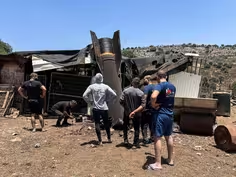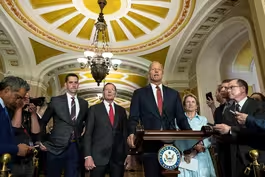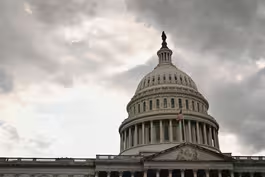
Sen. Warner questions delay of Iran strike briefing
Clip: 6/24/2025 | 7m 17sVideo has Closed Captions
Sen. Warner questions administration's delay of Iran strike briefing
On Capitol Hill, planned briefings from intelligence officials on the rapidly changing situation in the Middle East were postponed. The Senate briefing is now set for Thursday and the House briefing on Friday. Geoff Bennett discussed the White House's reason for pushing back the briefings with Sen. Mark Warner of Virginia, the top Democrat on the Senate Intelligence Committee.
Problems playing video? | Closed Captioning Feedback
Problems playing video? | Closed Captioning Feedback
Major corporate funding for the PBS News Hour is provided by BDO, BNSF, Consumer Cellular, American Cruise Lines, and Raymond James. Funding for the PBS NewsHour Weekend is provided by...

Sen. Warner questions delay of Iran strike briefing
Clip: 6/24/2025 | 7m 17sVideo has Closed Captions
On Capitol Hill, planned briefings from intelligence officials on the rapidly changing situation in the Middle East were postponed. The Senate briefing is now set for Thursday and the House briefing on Friday. Geoff Bennett discussed the White House's reason for pushing back the briefings with Sen. Mark Warner of Virginia, the top Democrat on the Senate Intelligence Committee.
Problems playing video? | Closed Captioning Feedback
How to Watch PBS News Hour
PBS News Hour is available to stream on pbs.org and the free PBS App, available on iPhone, Apple TV, Android TV, Android smartphones, Amazon Fire TV, Amazon Fire Tablet, Roku, Samsung Smart TV, and Vizio.
Providing Support for PBS.org
Learn Moreabout PBS online sponsorshipGEOFF BENNETT: Well, on Capitol Hill today, planned briefings from intelligence officials on the rapidly changing situation in the Middle East were postponed.
The Senate briefing is now set for Thursday and the House briefing now set for Friday.
A short while ago, I spoke with Senator Mark Warner of Virginia, the top Democrat on the Senate Intelligence Committee, and began by asking him about the White House's reasoning for pushing back the briefings.
SEN. MARK WARNER (D-VA): Well, they said it's because Secretary Rubio and Secretary Hegseth could appear.
They're at NATO now.
But we need this briefing sooner than later.
I have got a lot of questions.
And, in fact, we have seen the administration go from, when this conflict started, saying the United States would, of course, defend Israel, but Israel was on its own.
We then had from American intelligence community early last week, Monday of last week, reiterating what Director Gabbard had said that Iran had not made a decision to move towards a weapon.
We then saw, obviously, the administration change its position and say they were prepared to go after Iran's nuclear capabilities and -- but not regime change.
And then the president was -- tweeted -- and foreign policy by tweet is always a bad way to operate -- said he was for regime change, and now that's been taken back, I understand.
So I have got a lot of questions, questions that -- long before this even took place, like, can the bunker-buster bombs alone take out the Iranian nuclear facilities?
And those questions still remain.
GEOFF BENNETT: Well, on that point, the U.S. military strikes on three of Iran's nuclear facilities last weekend reportedly did not destroy the core components of the country's nuclear program and likely only set it back by months.
This is according to an early assessment by the Pentagon's intelligence arm.
I know you can't discuss specific intelligence, but so far as you know, what should we understand about the strategic impact of those strikes?
SEN. MARK WARNER: Well, Geoff, I actually believe that classified information needs to say classified, and I'm not going to comment on any of those public reports about classified information.
I will say, ask this, the question I just posed, can dropping the bombs alone completely take out Iran's nuclear capabilities?
Because the conflict was already in process, did Iran in any way move any of the enriched uranium to other sites?
The question is also -- is, now that the United States has attacked, is this -- has Iran agreed not only not to strike back against our close to 40,000 troops, whose safety is paramount, in region?
And are they not going to strike directly?
Does that also go to their proxies in the region, Hezbollah, some of the Shia militia groups?
Does that also go to Iran not taking cyber action against the United States?
So I wish the administration -- the administration should have had that report to us today.
They should have, frankly, notified the whole Gang of Eight before this attack.
But they need to get up here and answer the very legitimate questions that we as senators have, but also that Americans have.
Are we still in harm's way?
Has this job been fully carried out?
And, if not, what next?
Listen, I would hope it all would work out as the president has proposed, but we can't rely on hope alone.
And, clearly, Iran -- I don't want to mince any words.
Iran should not have a nuclear weapon.
This is a rogue regime.
But there are reasons that previous presidents, including President Trump in his first term, didn't take this kind of action, because these same questions about, can you take it all out with bombs only, without additional activities, and then what next?
I think the American people and we, as their elected representatives, need those answers sooner than later.
GEOFF BENNETT: Since World War II, nearly every time a U.S. president has used military force, it has been without explicit prior approval from Congress.
What makes this time different?
SEN. MARK WARNER: Well, what makes this time different is, most of the times that those actions have taken, there's been an immediate action that's required, generally an immediate response.
In this case, we actually have the Israeli foreign minister on Saturday before the attack took place said the Israeli actions alone had set the Iranian effort back a couple years.
Is that true?
If it is true, what was the precipitating action of this moment at this time?
Did our intelligence get it wrong that Iran had actually decided to move forward on a bomb, or did our intelligence get it right, and did the president rely or simply depend upon another country's intelligence and totally disregard our intelligence?
We have also seen historically that, when a president disregards intelligence or, in the cases we saw with Iraq, changes intelligence to meet their needs, those are usually bad outcomes for America and Americans.
GEOFF BENNETT: You mentioned the range of dangers posed by Iran retaliating.
What specific steps should the administration, should Congress take right now to protect Americans at home and abroad?
SEN. MARK WARNER: Well, clearly, we have got our troops on heightened alert.
But what are we doing to continue to increase our cyber defense capabilities, particularly since this administration on the Cybersecurity Agency has literally cut half of the personnel?
What are we doing to make sure that we're -- for example, China's already penetrated our telecom networks, but we have no plan on getting them out.
What are we doing to prevent Iran from taking similar cyber action?
And the idea of surrogates.
I think one of the things that was good news so far that we had not seen either Hezbollah, even though they're in a much weakened state in Lebanon, or the Iraq Shia militias that are very loyal to Iran take actions against our troops.
Does this cease-fire mean those third-party actions are also going to be prohibited?
I don't know the answer to those questions.
And I think it's incumbent upon the administration to lay out what happened, how much of their goals got obtained, and what is the plan going forward?
I also think our remaining friends around the world, which obviously have been somewhat diminished with some of the president's actions on sometimes treating our friends as foes and are foes like Russia as friends.
How are we going to deal with this on any kind of concerted action by Iran as well?
GEOFF BENNETT: Democratic Senator Mark Warner of Virginia, thanks again for your time this evening, sir.
We appreciate it.
SEN. MARK WARNER: Thank you, Geoff.
How proposed cuts to Medicaid could affect rural hospitals
Video has Closed Captions
Clip: 6/24/2025 | 4m 3s | How proposed cuts to Medicaid could affect rural hospitals (4m 3s)
Israel-Iran ceasefire holds as Trump lashes out at both
Video has Closed Captions
Clip: 6/24/2025 | 9m 39s | Fragile Israel-Iran ceasefire holds as Trump lashes out at both sides (9m 39s)
Time running out for GOP to pass tax plan by Trump deadline
Video has Closed Captions
Clip: 6/24/2025 | 4m 38s | Time running out for GOP to pass massive tax and spending plan by Trump's deadline (4m 38s)
Trump's attempt to claw back funding, explained
Video has Closed Captions
Clip: 6/24/2025 | 7m 23s | Trump's attempt to claw back funding approved by Congress, explained (7m 23s)
What's next for Iran's regime? Analysts weigh in
Video has Closed Captions
Clip: 6/24/2025 | 7m 30s | What's next for Iran's regime after U.S. strikes and Israel ceasefire? Analysts weigh in (7m 30s)
White House set to roll back national forest protections
Video has Closed Captions
Clip: 6/24/2025 | 6m 54s | White House set to roll back protections for nearly 60 million acres of national forests (6m 54s)
Providing Support for PBS.org
Learn Moreabout PBS online sponsorship
- News and Public Affairs

FRONTLINE is investigative journalism that questions, explains and changes our world.

- News and Public Affairs

Amanpour and Company features conversations with leaders and decision makers.












Support for PBS provided by:
Major corporate funding for the PBS News Hour is provided by BDO, BNSF, Consumer Cellular, American Cruise Lines, and Raymond James. Funding for the PBS NewsHour Weekend is provided by...





